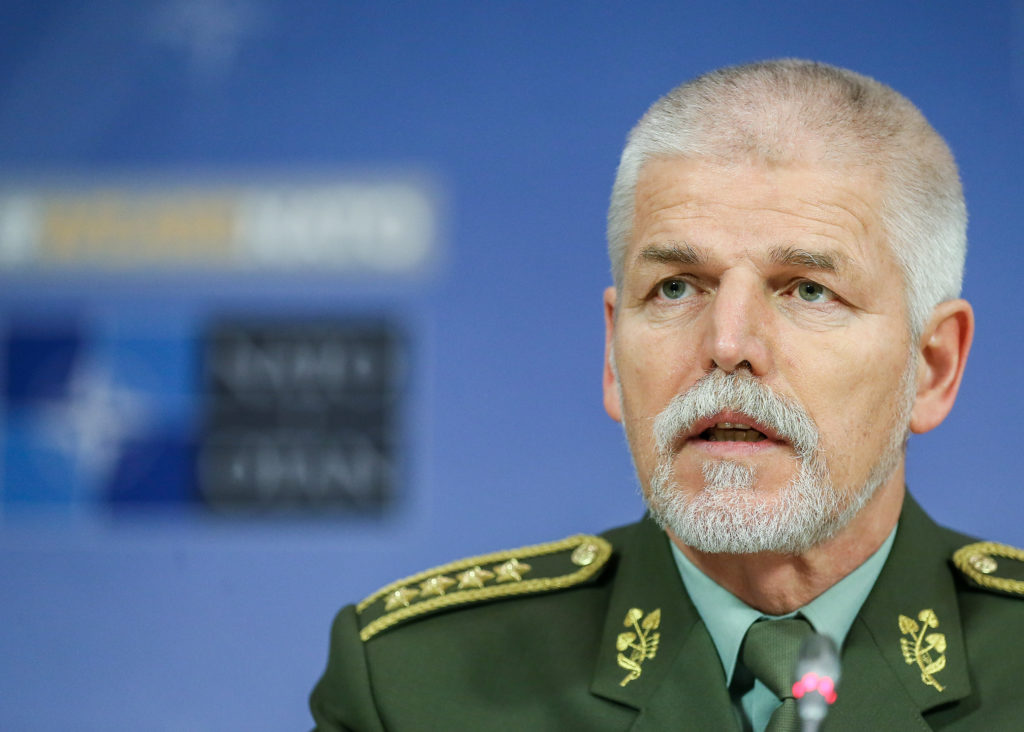William Nattrass is a freelance journalist and commentator based in Prague.
Serving as NATO’s Military Committee chairman from 2015 to 2018 and a former chief of staff of the Czech Army, Petr Pavel is now a leading candidate in the Czech Republic’s presidential election next year. And most tellingly, he believes that Russia’s revanchist mindset goes well beyond President Vladimir Putin, and is embraced by many Russian citizens themselves.
In a recent interview, Pavel shared with me that the West should be extremely cautious about welcoming Russians who are now trying to flee Putin’s mobilization order. “Opposition to mobilization is not a revolt against the regime, or any kind of support for Ukraine,” he said. “These Russians still believe in punishing Ukraine, just not involving the general public.”
“The young men trying to leave the country are worried about their own lives — that doesn’t mean they’re against the war. I’m sure that many of them will continue to support Putin’s nationalist policies,” he added.
“I would definitely not agree that everyone fleeing Russia is our friend.”
Rather, Pavel believes an influx of Russians would pose an unacceptable security risk, particularly as large-scale protests in Prague indicate that support for Ukraine may be wavering among some sections of the Czech public.
“Can you imagine a country like ours, which already has a strong Russian ‘fifth column,’ accepting another 40,000 or 50,000 Russian men?” he asks. “Men who wouldn’t support democratic regimes, who wouldn’t be grateful to the Czech Republic as a democratic country, who would stay within their nationalist positions? This would be a risk to our internal security.”
The Czech government has taken a tough stance on the war in Ukraine, but this stance is now being blamed by some for the country’s economic woes. And protests attended by tens of thousands in Prague’s Wenceslas Square have been marked by strong anti-Western sentiments, with many calling for the country to leave the European Union and NATO, suggesting that those institutions provoked the war in Ukraine.
On the presidential campaign trail, Pavel hears such views throughout the country, and he says it has become all too easy to blame the West for global issues.
“Anybody who knows about the functioning of the EU and NATO understands that if we weren’t a member of either, we would be far worse off. But it’s so easy to point to an external source for our problems,” he sighs.
Anger is also being fed by a lack of trust in mainstream media and politicians — something that Pavel believes is partly attributable to malign Russian influence. “I think Hungary, Slovakia and the Czech Republic are clear examples of Russia’s hybrid warfare succeeding, making the population disbelieve all the pillars of power — including politicians and the media.”
“But we in the West are also partly responsible by being unable to admit that we make mistakes,” he concedes. “Just look at Libya, for example. We stuck to the assessment that Libya was a strategic success — but we didn’t have any political solution, and in the end, we caused more problems than we solved. All the Russians had to do was say: ‘This is what strategic success looks like to the West. Do you want this?’”
Petr Pavel believes an influx of Russians would pose an unacceptable security risk | Stephanie Lecocq/EPA-EFE
“We’re so afraid to admit weakness that we create a lot of space for hostile propaganda,” Pavel admits.
He also laments the domestic success of Putin’s propaganda, claiming that a nationalist mindset, stemming from resentment over Russia’s declining influence, makes an imminent coup displacing Putin and changing Russian policy highly unlikely.
“There will be no democratic revolution in Russia for the foreseeable future,” he says. “Not just because of the regime’s strong position, but also because of the mentality of many Russians.”
“There’s no room for a true opposition movement to grow. Even Alexei Navalny isn’t really a proper opposition leader. He’s definitely not a liberal democrat, he’s another kind of Russian nationalist, although he would, of course, be a better negotiating counterpart than the current leadership.”
This level of public support for Putin’s agenda provides an unsettling backdrop for the Russian president’s insistence that he’s “not bluffing” when it comes to the potential use of nuclear weapons too. And Pavel notes that Moscow’s reliance on the nuclear threat is “the only parameter of being a superpower that Russians still have.”
Resentment over this lost superpower status also severely hampered negotiations during Pavel’s tenure as chief of the NATO Military Committee in the years following Crimea’s annexation.
“I was closely in touch with Russia, and I tried to be fair, not always painting things in black and white. Still, there was no getting around the fact that the West took several steps toward Russia. There were a number of efforts to engage and offer them a greater share in dealing with global issues.”
“But Russia didn’t see any value in partnership because they don’t believe in the ‘win-win’ principle,” he says. “In their thinking, you either win or lose. There’s a saying in Russia: ‘If I’m a General, you’re stupid; if you’re a General, I’m stupid.’ There’s no understanding that both sides can get something out of a situation.”
He recalls suggesting “that instead of focusing only on Ukraine, we should talk about the overall security situation from the Black Sea to the North Sea, including exercises, military presence at borders, new weapons and so on. But they didn’t want to have that discussion. They would just claim that the West was bringing Ukraine closer to NATO, as another part of Western betrayal.”
At the same time, Pavel admits that NATO underestimated Putin’s willingness to use brute force to achieve its stated goals — something the West can no longer have any illusions about.
“Russians are often very straightforward,” he warns. “When Putin was talking about a Russian world, we didn’t take him seriously. But he meant it.”




